Who Needs a Hearing Aid for Mild Hearing Loss?
Mild hearing loss often creeps up slowly and quietly. You might not even realize it’s happening until conversations become difficult. If you have trouble hearing softer sounds or struggle in noisy places, help is available. Today’s hearing aids are powerful tools, even for mild hearing loss. If you are wondering if you need a hearing aid for mild hearing loss, read on.

What Is Mild Hearing Loss?
Hearing loss comes in degrees, and mild hearing loss is the first noticeable level. People with mild hearing loss struggle to hear sounds between 26 and 40 decibels (dB). These include whispers, soft music, flowing water, and distant conversations. While “mild” sounds harmless, it still impacts your daily communication significantly. The sooner you address it, the better you protect your brain and social life.
How Mild Hearing Loss Affects Your Daily Life
Mild hearing loss can quietly interfere with your daily activities and relationships. At first, you might dismiss small signs as normal distractions or background noise. However, missing important sounds can quickly add frustration and emotional strain. You may notice conversations feel harder, even in familiar or quiet settings. Understanding jokes, quick comments, or whispered remarks may become especially challenging.
Watching television may require higher volumes, frustrating your family or roommates. Phone calls might feel stressful because you cannot catch every word easily. Participating in meetings or group events can cause anxiety or self-doubt. Restaurants, parties, and busy environments might feel overwhelming instead of fun.
You may gradually find yourself withdrawing from social situations without realizing why. Over time, missing key sounds can cause loneliness, fatigue, and even depression. Untreated mild hearing loss can also increase mental load, straining your brain. Daily tasks like cooking, driving, and shopping may become unexpectedly difficult.
Protecting your hearing now helps you stay confident, independent, and socially connected longer.
Common Signs You Might Need a Hearing Aid for Mild Hearing Loss
Recognizing early symptoms of mild hearing loss is essential for taking action. Here are key signs to watch for that often go unnoticed at first:
- You Frequently Ask Others to Repeat Themselves
Repeating conversations may feel annoying for you and frustrating for those around you. - You Struggle to Hear in Noisy Environments
Background chatter, music, or crowd noise can drown out voices you want to hear. - You Turn Up the Volume More Than Others Prefer
Family members or friends often comment that your TV or radio is too loud. - You Notice Difficulty with Soft or Distant Sounds
Whispers, water running, birdsong, and other subtle sounds seem to disappear. - You Lip-Read More Often Than Before
You rely heavily on watching people’s faces to understand what they are saying. - You Misinterpret Words or Phrases Easily
You often hear something different than what was actually said, causing confusion. - You Feel Tired After Social Events
Straining to hear all day can cause mental exhaustion, irritability, or headaches. - You Avoid Group Activities You Once Enjoyed
Feeling left out or overwhelmed, you may decline invitations you used to love. - You Feel Anxious About Making Phone Calls
Conversations without visual cues become intimidating or stressful over time. - You Notice Difficulty Locating Sounds
Determining where a sound is coming from becomes harder, affecting safety and awareness.
If you recognize any of these signs, it is time to schedule a hearing evaluation. Addressing these symptoms early with a hearing aid for mild hearing loss protects your quality of life.
Discover ways to stay safe with hearing loss.
Causes of Mild Hearing Loss
Several factors contribute to mild hearing loss, including:
- Age-Related Hearing Loss
The natural aging process can gradually affect your hearing abilities. - Noise Exposure
Loud environments, concerts, and machinery can damage delicate ear structures. - Infections or Illnesses
Ear infections, viruses, and Meniere’s disease can temporarily or permanently affect hearing. - Head Injuries
Trauma to the head or ear can lead to changes in hearing ability. - Genetic Conditions
Some individuals inherit conditions that cause gradual hearing loss.
Protecting your hearing now can reduce the risk of further deterioration.

Why a Hearing Aid for Mild Hearing Loss Matters
Some people believe they should wait until hearing worsens to get help. Research shows this approach can harm your long-term hearing and brain health. Hearing aids provide vital stimulation to your auditory pathways, keeping your brain sharp. Wearing a hearing aid early protects your ability to process speech and sounds.
Benefits of Using a Hearing Aid for Mild Hearing Loss
Hearing aids offer more than just louder sound. They deliver multiple benefits that can greatly improve your life:
- Improved Communication
Easier conversations with friends, family, and coworkers. - Brain Health Protection
Reduced cognitive strain, helping preserve memory and focus. - Greater Social Engagement
Enjoy parties, meetings, and public outings without anxiety. - Better Mental Health
Reduced risk of depression and social isolation. - Early Adaptation
Adjusting to a hearing aid is easier when the loss is still mild.
The sooner you start, the greater the benefits you experience.
Modern Hearing Aids Are Built for Mild Hearing Loss
Today’s hearing aids are highly advanced, even for early-stage hearing issues. Key features now available include:
- Directional Microphones
They focus on the person speaking while reducing background noise. - Bluetooth Connectivity
Stream music, calls, or TV shows directly to your hearing aids. - AI-Powered Sound Processing
Advanced algorithms adapt to your environment automatically. - Rechargeable Batteries
Long-lasting, convenient batteries make daily use easier than ever. - Discreet Designs
Modern hearing aids are nearly invisible and extremely comfortable.
Custom solutions exist to fit every lifestyle, activity level, and budget.
Learn more about hearing aids with Bluetooth and noise canceling capabilities.
Frequently Asked Questions About Hearing Aids for Mild Hearing Loss
Do I need to concentrate more instead of using hearing aids?
No. Mild hearing loss means your ears and brain need support, not just focus.
Can a hearing aid really make that much difference?
Yes. Many people feel amazed at the clarity and richness of sounds they regain.
How do I know if I’m a candidate?
If you have mild hearing loss, a hearing care provider can recommend the right solution.
Is it worth treating mild hearing loss early?
Absolutely. Early treatment preserves your hearing ability and protects brain function.
Understand why hearing aid fitting is the key to better hearing.
Protecting Your Hearing Going Forward
While not all hearing loss is preventable, you can take steps to protect your hearing:
- Wear Hearing Protection
Use earplugs or earmuffs when exposed to loud noises. - Lower the Volume
Keep music, headphones, and TV volumes at safe levels. - Get Regular Checkups
Visit your hearing care provider regularly, even if you feel fine. - Address Infections Promptly
Treat ear infections early to avoid complications. - Maintain Overall Health
Exercise, good nutrition, and avoiding smoking can help preserve your hearing.
Your ears are valuable — treat them with care and attention.
Find out more about how to prevent hearing loss and reduce its impact.
When Should You Contact a Hearing Care Provider?
If you notice any changes in your hearing, do not wait. Early intervention helps preserve your hearing and enhances your quality of life. Today’s hearing aids offer solutions that blend seamlessly into your lifestyle. There is no need to struggle when professional help is within easy reach.

Contact Stanford Hearing Today
If you think you might need a hearing aid for mild hearing loss, we can help. Stanford Hearing offers comprehensive hearing evaluations and personalized care. Our friendly hearing care providers work with you to find the best solution. Call Stanford Hearing today to schedule your consultation and start hearing life’s moments clearly again
